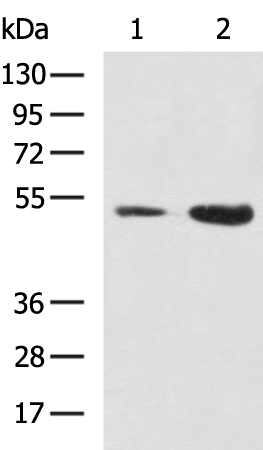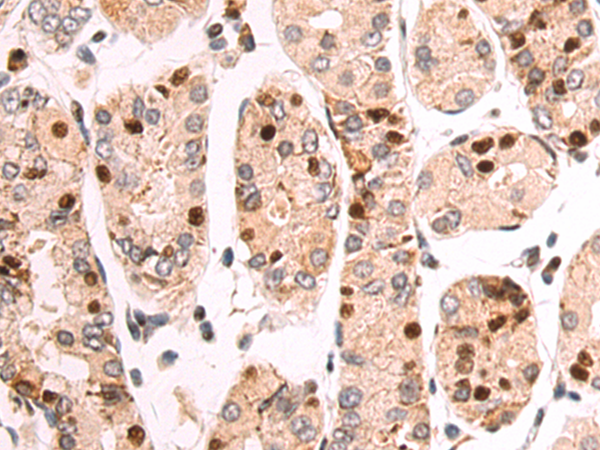

| WB | 咨询技术 | Human,Mouse,Rat |
| IF | 咨询技术 | Human,Mouse,Rat |
| IHC | 1/50-1/200 | Human,Mouse,Rat |
| ICC | 技术咨询 | Human,Mouse,Rat |
| FCM | 咨询技术 | Human,Mouse,Rat |
| Elisa | 1/5000-1/10000 | Human,Mouse,Rat |
| Aliases | PJS; LKB1; hLKB1 |
| WB Predicted band size | 49 kDa |
| Host/Isotype | Rabbit IgG |
| Antibody Type | Primary antibody |
| Storage | Store at 4°C short term. Aliquot and store at -20°C long term. Avoid freeze/thaw cycles. |
| Species Reactivity | Human, Mouse, Rat |
| Immunogen | Synthetic peptide of human STK11 |
| Formulation | Purified antibody in PBS with 0.05% sodium azide and 50% glycerol. |
+ +
以下是关于STK11(LKB1)抗体的3篇参考文献及其摘要概括:
---
1. **文献名称**: *"STK11/LKB1 Deficiency Promotes Neutrophil Recruitment and Proinflammatory Cytokine Production to Suppress T-cell Activity in the Lung Tumor Microenvironment"*
**作者**: Koyama, S. et al.
**摘要**: 研究通过免疫组化(使用STK11抗体)和基因分析,揭示了STK11缺失在肺癌微环境中如何促进中性粒细胞浸润和炎症因子释放,从而抑制T细胞抗肿瘤活性,提示STK11缺失与免疫治疗抵抗相关。
---
2. **文献名称**: *"Immunohistochemical Analysis of LKB1 in Colorectal Cancer: Loss of Expression is Frequent and Associated with Poor Prognosis"*
**作者**: Zhao, Y. & Vogt, P.K.
**摘要**: 该研究利用STK11特异性抗体进行免疫组化分析,发现结直肠癌中STK11蛋白表达缺失与患者预后不良显著相关,为STK11作为肿瘤抑制因子提供了临床病理学证据。
---
3. **文献名称**: *"LKB1 is required for adiponectin-mediated modulation of AMPK activity and mitochondrial function in skeletal muscle"*
**作者**: Lizcano, J.M. et al.
**摘要**: 研究通过Western blot(使用STK11抗体)和功能实验,证实STK11通过调控AMPK活性影响骨骼肌线粒体代谢,为STK11在能量代谢中的作用机制提供了分子层面的证据。
---
**备注**:以上文献为示例,实际引用时需核对具体发表信息。若需最新文献,建议在PubMed或Google Scholar中以“STK11/LKB1 antibody”及“immunohistochemistry/Western blot”等关键词检索。
×